What Is Verbal Abuse? Know the Signs and When to Get Help

In this article
There’s an old saying that goes something like this: Words can hurt or words can heal. And once spoken, they can’t be taken back.
We don’t always give it much thought, but words, the ones we choose and those others speak to us, hold tremendous power. They can comfort and reassure. They can boost self-esteem and feelings of confidence. They can communicate feelings of being loved and accepted.
On the flip side, they can hurt. They can wound tender hearts. They can demean and belittle, sending self-esteem plummeting. Sometimes, words and patterns of communication can become harmful, hurtful, and sometimes abusive.
Verbal abuse is more than just hurtful words and more than hurt feelings. It’s a destructive pattern of behavior that can undermine a person’s well-being and leave lasting emotional wounds.
Knowing how to recognize verbal abuse is an important first step to breaking free.
What is verbal abuse?
Verbal abuse is a type of abuse that occurs when one person uses words to dominate, ridicule, demean, or manipulate another person. It’s more than “mean words.”
This behavior is meant to maintain control or power over the person. Verbal abuse is often a precursor to partner violence and physical abuse.
This kind of abuse is most often seen in romantic relationships but can occur in any relationship: parent-child relationships, family relationships, and even co-worker relationships.
Younger women seem to be the most vulnerable.
Warning signs of verbal abuse
But everyone has arguments and says things maybe they wish they hadn’t, right? When do heated arguments cross the line into verbal abuse?
In a normal argument, people disagree over something, maybe even lose their tempers and say some unkind things. But it’s not a full-out assault on a person’s character. They are usually able to resolve or at least agree to disagree on whatever the conflict was about.
Verbal abuse takes things to a whole different level. It’s a pattern of behavior that is intended to control and intimidate. Those interactions look very different from a normal argument.
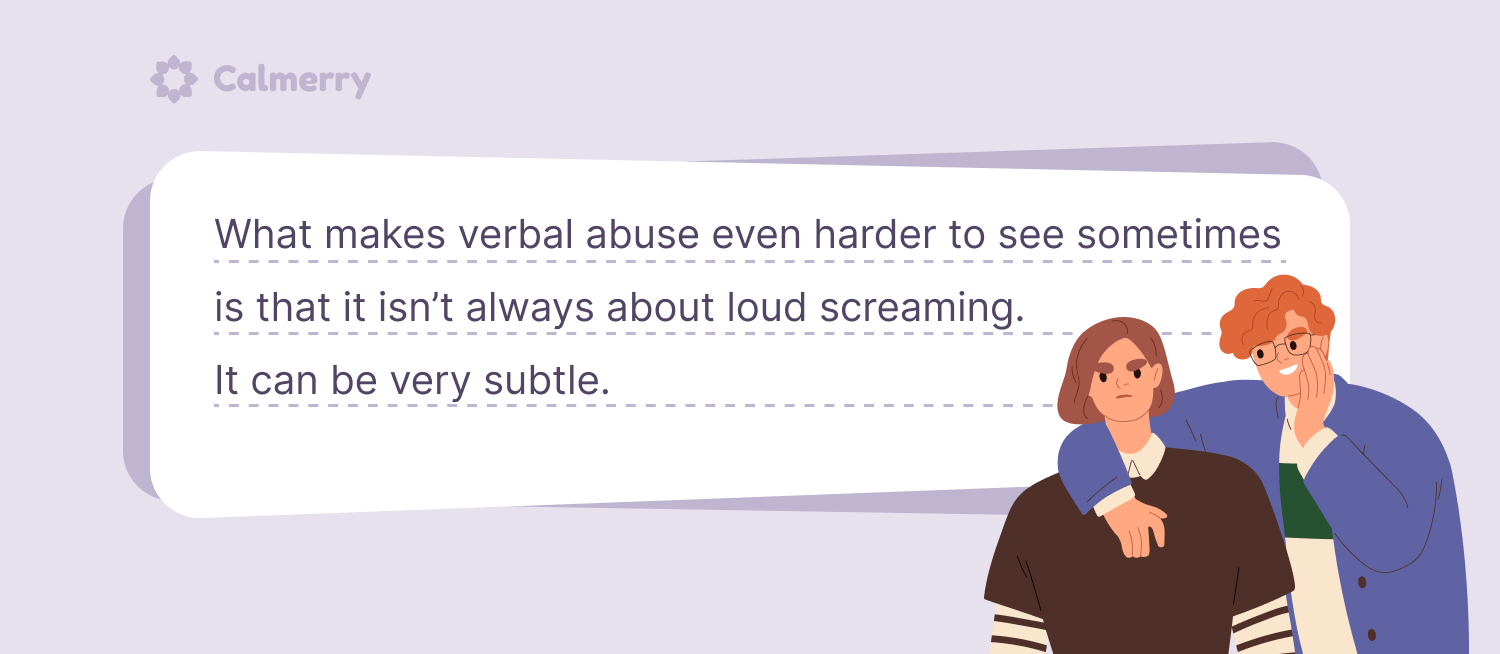
Some examples of verbal abuse might include:
- Arguments that come out of nowhere, and they blame you
- Attempts to humiliate you, then accuse you of being too sensitive and that you “can’t take a joke”
- Yelling and screaming at you, calling you names
- Verbally abusing you in private, but in public, it’s all hidden
- Getting in your personal space while they’re yelling at you
One of the dangers of being in an abusive relationship is that, over time, the abusive behavior can seem normal. It’s not usual for people experiencing verbal abuse to minimize or accept it. That perception can make it difficult to see your relationship clearly.
You can’t always see the warning signs of verbal abuse:
- You’re walking on eggshells trying to avoid an argument
- You’re feeling unsafe, fearful, or threatened
- You avoid sharing anything personal for fear that they will mock or ridicule you
- You’re feeling belittled, put down, or criticized for your appearance, actions, or what you think
- You’re feeling ashamed or “less than”
- You dread being in public for fear that they will humiliate or embarrass you
- You sometimes think the behavior is “not that bad” and find yourself wondering if they are right.
What makes verbal abuse even harder to see sometimes is that it isn’t always about loud screaming. It can be very subtle.
Those little “jokes” that take a jab at you may look innocent on the surface, but they can carry quite a hurtful impact. It’s a type of battering that leaves no outward signs like cuts or bruises but can leave deep emotional wounds.
Verbal abuse vs. emotional abuse – aren’t they the same thing?
It’s a common misconception that verbal abuse and emotional abuse are the same, and the terms are often used interchangeably.
A broad concept, emotional abuse is generally considered to be any nonphysical behavior or attitude that is used to control, subdue, degrade, punish, or isolate another person through the use of humiliation or fear. It severely impacts the emotional and psychological well-being of the person, and it is often a precursor to violence and physical abuse.
Examples of emotional abuse might include keeping the person from their family or making decisions for them.
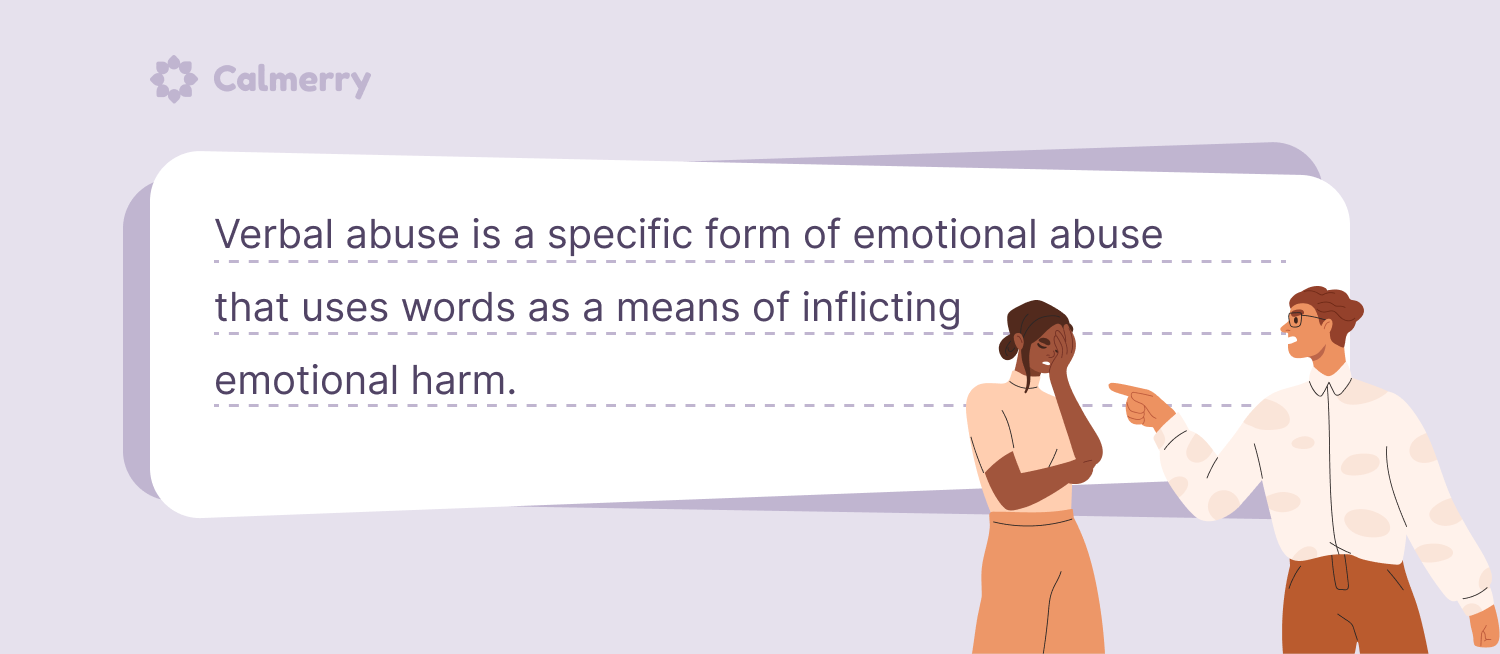
Verbal abuse is a specific form of emotional abuse that uses words as a means of inflicting emotional harm. It has often been described as “crazy-making” because it is a form of control over another person that impairs their ability to recognize and deal with the reality of the relationship.
Types of verbal abuse
Verbal abuse can take many forms. Some are quite overt, while others are more subtle. Here are a few of the most common types. Some you’ve probably heard of. Others might surprise you.
Name-calling
You might not immediately associate name-calling with being abusive, and it’s not always obvious. It can sometimes be disguised as a “pet name” or “teasing,” but it is no less hurtful.
Name-calling can have devastating effects on self-esteem and self-worth.
Bullying
Bullying is a form of verbal abuse that can include name-calling, insults, teasing, intimidation, and homophobic or racist remarks. It most often occurs in family or friend relationships, especially for school-age kids.
Manipulation
Manipulation is a control tactic. It’s the person’s attempt to make you do something you don’t want to do without directly telling you to do it.
Gaslighting
Gaslighting is a form of manipulation intended to convince you that what you’re experiencing isn’t real and that it’s your fault. Over time, it can make you dependent on your abuser, making it harder to leave them.
Criticism
Unlike constructive criticism, this form of criticism is harsh and aimed squarely at the person’s self-esteem. It’s meant to demean or degrade.
Ridicule
A close cousin of criticism, ridicule makes you the butt of the abusive person’s jokes. It’s more than harmless teasing and often hits those vulnerable spots. It’s not funny, it’s hurtful.
The silent treatment
This one might surprise you. The silent treatment, also known as stonewalling, is a form of withholding attention or affection. It might take the form of refusing eye contact or conversation or even being near you. The intent is to make you “earn” or work to regain the person’s attention.
Threats
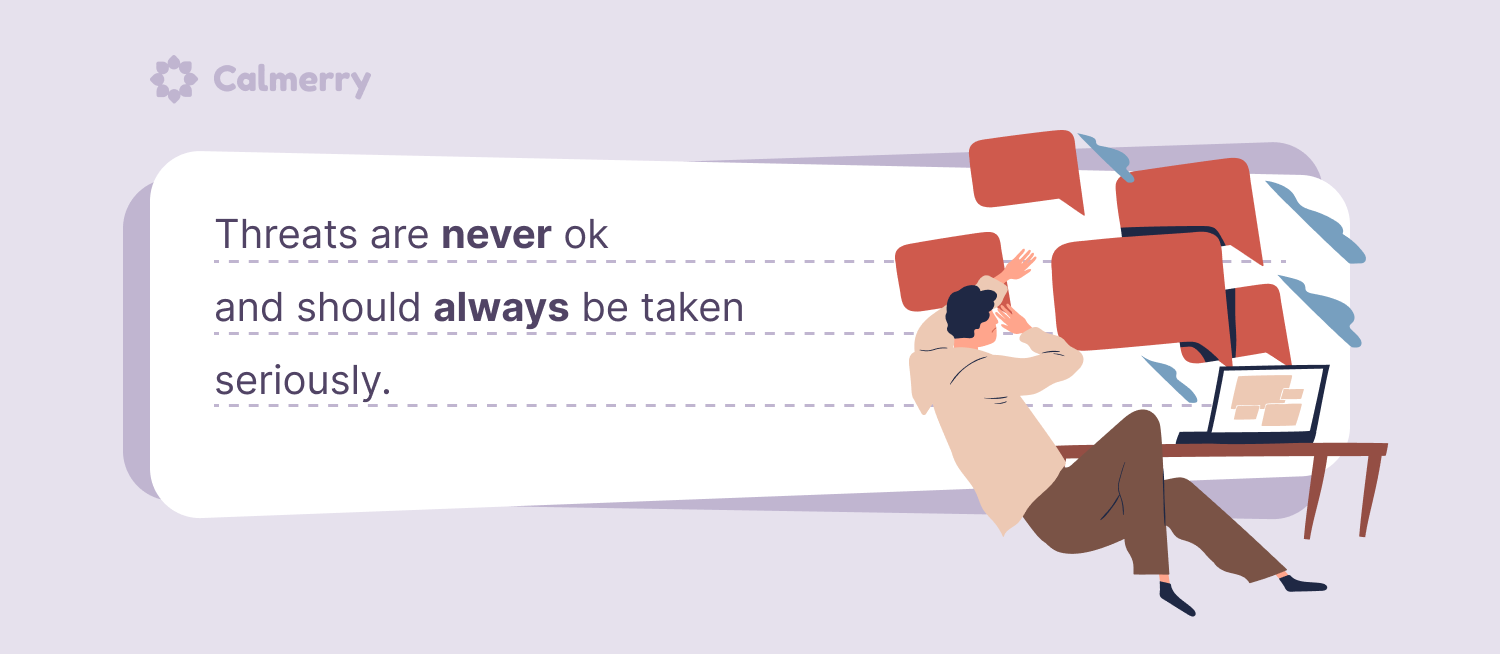
One of the more serious types of verbal abuse, threats are meant to control and manipulate someone through fear. Threats are never ok and should always be taken seriously.
The impact of verbal abuse
The effects of verbal abuse can be devastating and have been linked to mental health issues, including:
- Depression
- Anxiety
- Stress
- Feelings of shame and guilt
- Diminished self-esteem
- Post-traumatic stress disorder (PTSD)
Researchers have found that exposure to verbal abuse, including ridicule and humiliation from parents, partners, or peers can even affect brain development.
How to deal with verbal abuse
Once you recognize verbal abuse in a relationship, you can then decide how or if you want to deal with it. It’s not likely to get better by itself, and trying to reason with them isn’t likely to help.
It’s an important decision and one not to be made lightly. Of course, you always want to consider your unique circumstances and make the choice that’s best for you.
Safety first
The first step, before you do anything, is to ensure your safety. While the behavior until now may have been verbal, verbal abuse can escalate into a dangerous situation.
You need a safety plan. You may never need to use it, but it’s a must when dealing with an abusive situation. The National Domestic Violence Hotline has great tips for creating a safety plan and leaving an abusive situation safely.
Set your boundaries
If you decide to confront the issue, you have to let them what you expect going forward. Setting boundaries lets others know how you expect to be treated.
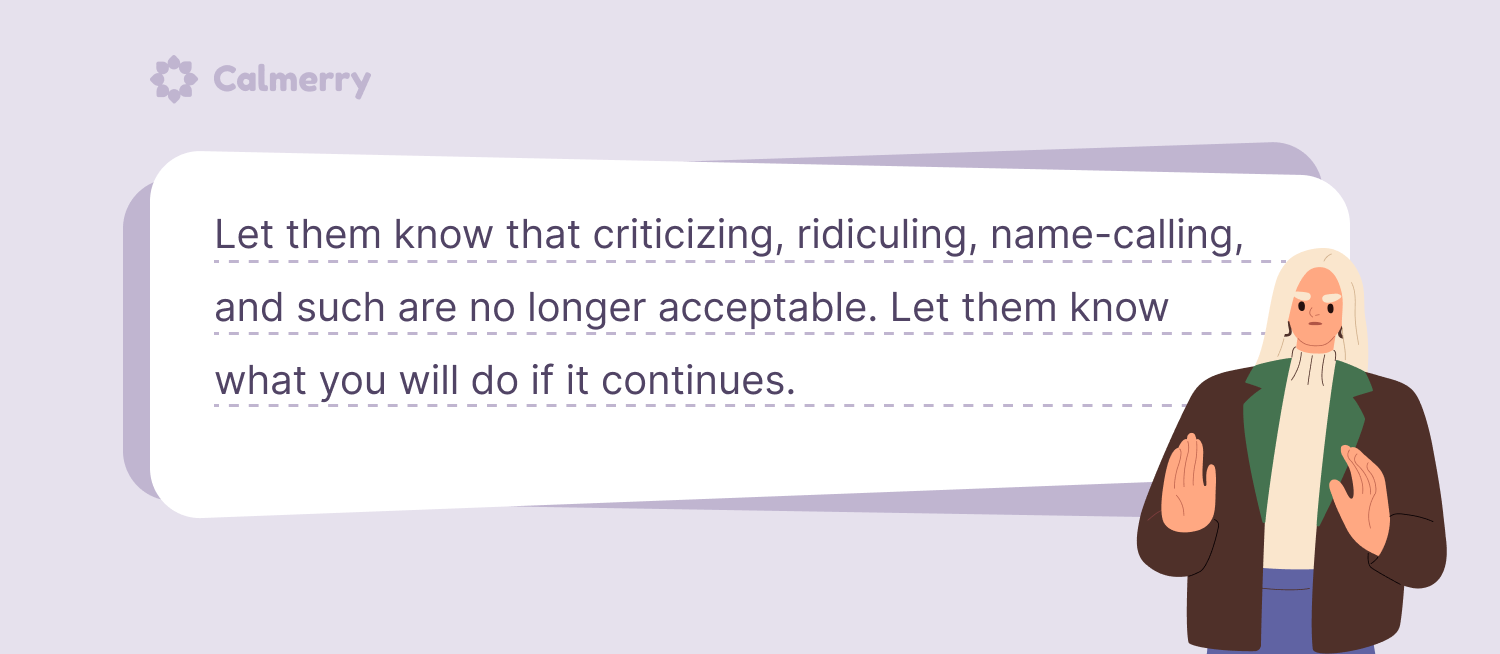
Be sure that you are willing to hold whatever boundary you set. For example – “If you ridicule me, I will walk away.”
Limit your time with them
Limit the amount of time you spend with them. Take some time apart if you can. Spend time with people who support you and treat you with respect.
Creating distance allows you to gain some perspective on the situation. And it’s a reminder of how healthy relationships should be.
Leave or stay?
There’s no right or wrong answer here. Things can and sometimes do get better when the person is willing to acknowledge their behavior and make changes. Sometimes, they decide not to. Only you can decide what is best for you.
Knowing when to stay or leave is not an easy decision, especially if you share children together. It’s not a decision to be made lightly.
Before you decide, consider talking to a trusted friend or seeking help from a counselor trained in working with abuse issues. Having a fresh perspective can help you see aspects of the situation you may be unable to in the moment.
You may also need the guidance of a therapist to help you with a safety plan.
What if the abusive person is someone at work?

You may not have the option to avoid the abusive person. They may be your supervisor. Simply leaving the job may not be realistic. Maybe you can’t afford to just quit.
There are things you can do:
- You can set your boundaries and enforce them. Let the person know you don’t like to be treated that way. They may stop. They may not.
- Limiting your time with them may be hard, especially if it’s someone your role requires you to interact with. Stay focused on your work and limit your interactions to business only and keep them as brief as possible.
- Consult your employee handbook for the next steps. Some companies have policies for dealing with inappropriate workplace behavior.
- Document everything. If you’re asked to explain your situation, you want to be accurate.
- Look for another job. Things may get better, but they may not. Having an option allows you to be prepared for whatever decision you ultimately make.
Seek help
Dealing with and healing from the abuse of any kind is difficult to do alone. Friends and family are a great source of support.
However, when it comes to navigating the complex emotions and long-term impact of abuse, it’s often invaluable to talk to a therapist who can provide specialized guidance and teach you healthy coping skills to deal with the effects of the abuse.
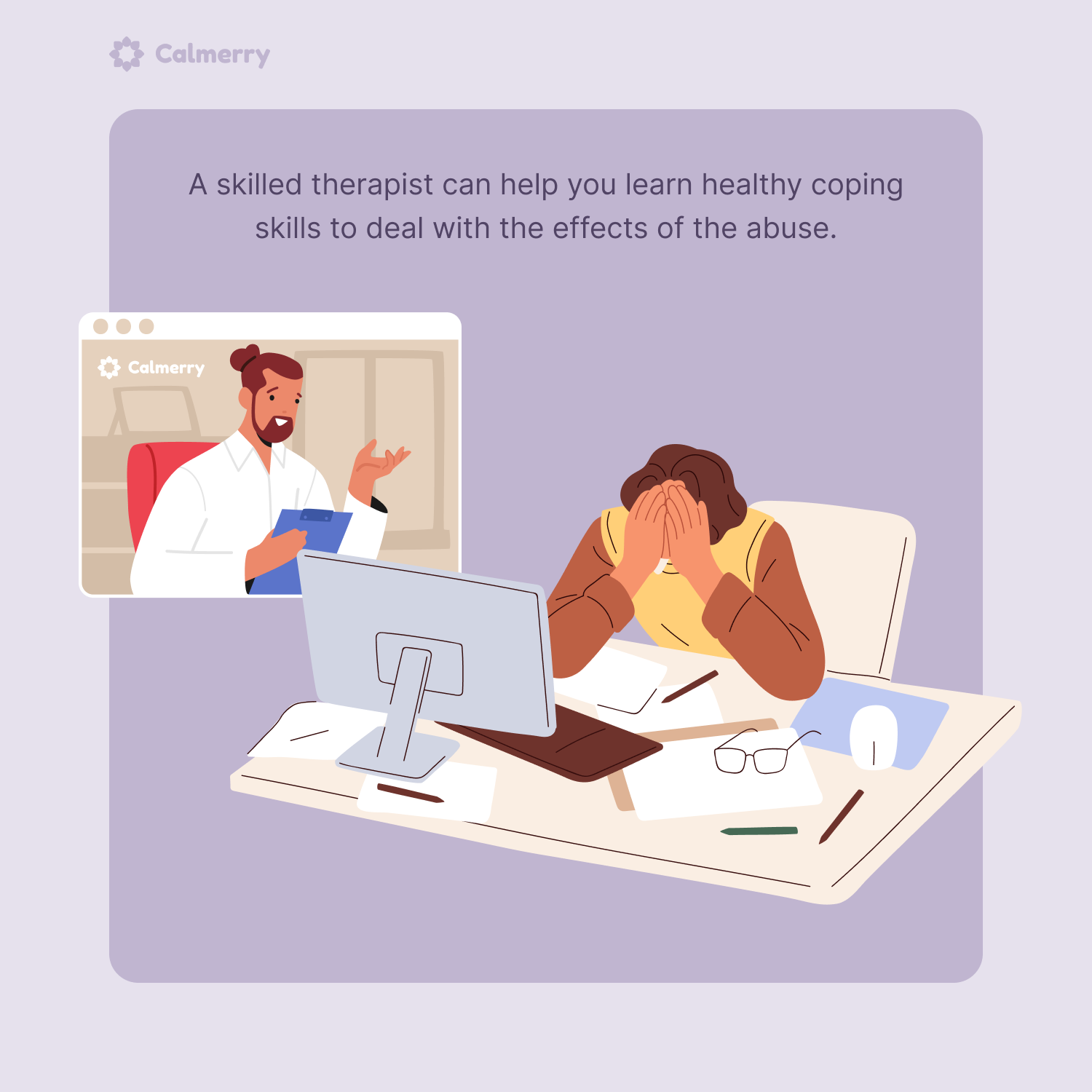
Finding help is easier than ever with the rise in online therapy options. Online therapy allows you to access care when and how it makes sense for you. And online therapy has been shown to be as effective as traditional in-person counseling. Calmerry provide a convenient and accessible way to connect with licensed therapists from the comfort of your own home, making it even more convenient to address your anxiety and panic disorder concerns.
When you feel ready, there is help, and there is healing.
online therapy
live video session



